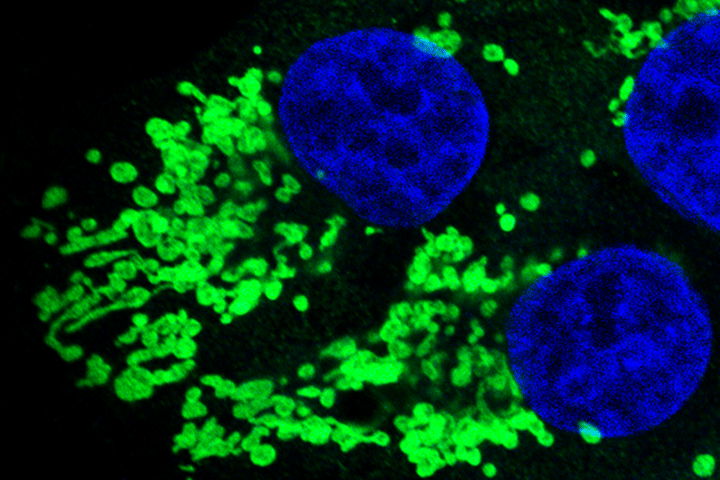New Clues in Pancreatic Cancer Weight Loss

Although weight loss is associated with many diseases, cancer-related weight loss can be especially difficult for patients and families alike.
Pancreatic cancer patients often experience weight loss early in the disease process. Later, they may face a metabolic storm called cachexia, a disorder causing severe weight and muscle loss that can make further treatment difficult and tasks of daily living almost impossible.
While it seems logical that treating weight loss would improve a patient’s well-being and improve survival, physician-scientists like Dr. Matthew Vander Heiden, Associate Professor of Biology and Associate Director of the Massachusetts Institute of Technology’s Koch Institute for Integrative Cancer Research (Cambridge, Massachusetts), and others believe there may be more to the story.
Among questions that still need to be answered: Does all weight loss truly affect cancer survival? What mechanisms drive weight loss in pancreas as well as other cancers? And could earlier-stage loss of some tissues—such as muscle or fat—be a harbinger of pancreatic cancer, a kind of early-warning signal for a disease where earlier detection is sorely needed? Taken together, the answers to these questions could conceivably lead to new diagnostic and treatment developments that could improve the lives of pancreatic cancer patients.
“In the early days of cancer research, understanding metabolism was a big topic, but then fell out of favor for several reasons, including a growing ability to study cancer genetics,” Vander Heiden says. “But it became clear that metabolism is absolutely fundamental to the basic biology and the life and death of a cell. And the life and death of a cell is fundamental to cancer growth. This led us and others to focus again on studying the metabolism of tumors.”
In a recent paper published in the journal Nature, Vander Heiden, along with colleague and co-author Dr. Brian Wolpin, Director of the Gastrointestinal Cancer Center at Dana-Farber Cancer Institute, Boston, conducted research that sheds new light on a mechanism for how pancreas tumors lead to weight loss.
Metabolic Sleuths for Weight Loss
A hallmark of a cancer cell is its ability to divide uncontrollably. The result: a massive flood of new tumor cells. An important fuel for this cell growth is glucose, a type of sugar, as well as amino acids. Changes in how nutrients are metabolized, or broken down for energy or converted into the building blocks of new cells, contribute to both the development and progression of pancreatic cancer. Prior to this study, the team showed that the breakdown of muscle tissue is common in early pancreatic cancer; this leads to a buildup of branched-chain amino acids in the blood. This can take place up to about 10 years prior to diagnosis, based on an analysis of blood samples. “What we didn’t know is what drives this process, and what this means for the patient and for the tumor,” Vander Heiden explains. “There were a lot of questions that still needed to be answered.”
In the newest study, from the Koch Institute, the Broad Institute (Cambridge, Massachusetts), and Dana-Farber, researchers implanted early-stage pancreatic tumors into healthy mice. What they found is that the ensuing weight loss, in early-stage disease (which may not be related to the more significant weight loss of cachexia), happened due to a reduction in important pancreatic enzymes. (One job of the pancreas is to make digestive juices—composed of these powerful enzymes— which are then released into the small bowel after meals to break down and digest food.)
The team treated a cohort of mice with what are known as replacement enzymes, a treatment used in some pancreatic cancer patients (as well as others with diseases like chronic pancreatitis), which also disrupts enzyme production. “The general thought is that if you treat the weight loss (with replacement enzymes), a patient, or in this case a mouse, would somehow do better, potentially survive longer because they gained weight,” Vander Heiden says.
However, the mice treated with enzymes gained weight and didn’t live as long as a cohort of mice that ate a normal diet, even though all of the mice had pancreatic cancer. The team also analyzed medical records and blood samples from 782 pancreatic cancer patients and found no link between degree of tissue wasting at the time of diagnosis and length of survival.
“What that tells us is that we can’t make the assumption that weight loss is always a negative in terms of cancer survival,” Vander Heiden notes. “But this is just one mouse study and, at this point, we are not sure how this applies to humans. However, we can say it appears that tissue wasting at the point of diagnosis may not always be bad.” That finding, while surprising, is consistent with studies in mice that have shown that calorie restriction can have a protective effect against cancer and other diseases.
The theory as to why tissue mass is lost early in the disease process has been that there was a problem in a signaling factor, such as an overproduction of a hormone. But in the new study, the research team discovered that where a tumor takes hold, rather than a signaling factor, can be an important contributor to weight loss. “If a pancreatic tumor was implanted under the skin or in the lung or in other parts of the body, early tissue wasting didn’t happen,” says Vander Heiden. “So it probably isn’t as simple as a chemical signal produced by the cancer cells that is causing all muscle and fat loss. In this case, it was the location, the pancreas.” But it almost certainly will be different for other cancers, and some chemical signals could still be involved in pancreas cancer too, he adds.
Looking to the Future
Although this study focused on pancreatic cancer, Vander Heiden and colleagues believe it is important to look at all cancers as well as other diseases that cause wasting. That’s because in some cancers weight gain may be helpful—or not helpful—due to the metabolic mechanisms that trigger the wasting. “We can’t say right now that weight loss is bad (in pancreas cancer) even when it gets to the point of cachexia, because we simply do not know,” Vander Heiden explains. “It (weight loss) may turn out in cases to be protective; in other words, part of the body’s response to fighting the cancer. But that will not be true for all cancers, and that’s what we need to better understand.”
It’s clear pancreas cancer desperately needs earlier detection, but Vander Heiden does not believe a single test will be the answer. Rather, multiple tests, working together, may help patients. “Earlier detection for pancreatic cancer will need multiple tests, like heart disease, for example,” he says. “With heart disease you look at a lot of factors like family history, personal history, cholesterol, blood pressure, smoking, and diabetes to assess risk, not just one thing. As we start to find out more about cancer metabolism, evidence of unexplained tissue or muscle wasting could be one of those factors for pancreatic cancer.”






